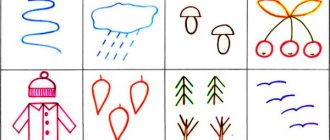Children's volunteering - as a means of effective socialization of preschool children in public organizations
Children's volunteering - as a means of effective socialization of preschool children in public organizations
Federal state educational standard for preschool
education defines targets at the stage of completion
of preschool education
:
— The child masters basic cultural means
, ways of activity, shows initiative and independence in different types of activities: - play, communication, cognitive - research activities, design, etc.; able to choose his own occupation and participants in joint activities.
- The child has a positive attitude towards the world, towards different types of work, other people and himself, has a sense of self-esteem; actively interacts with peers and adults, participates in joint games.
— Able to negotiate, take into account the interests and feelings of others, empathize with failures and rejoice in the successes of others, adequately express one’s feelings, including a sense of self-confidence, tries to resolve conflicts. Able to express and defend his position on various issues.
- Able to collaborate and perform both leadership and executive functions in collaborative activities.
Modernization of education requires working not only in the functioning mode, but also in the development mode. Developing means using innovative technologies. The novelty is that volunteer
the movement is organized in a
kindergarten
.
Preschool
age is traditionally considered a period of intense
socialization
.
Modern children live and develop in completely new sociocultural conditions
.
Extremely busy parents, a generation gap, isolation of the child in the family and other trends negatively affect the socialization of modern children
.
Effective socialization
is one of the main conditions for a child’s life in society in general and the child’s personal readiness for school in particular.
preschool children is increasingly being raised.
.
The achievement of these goals is facilitated by various types of activities used in pedagogy, one of them is volunteering
.
Volunteering
is a synonym for the word
“volunteer”
.
Therefore, volunteering
is first and foremost an initiative.
Children begin to develop an active life position, the ability to navigate in society
, live
among
people and, if possible, help them.
Volunteering
- this is free help; as a result of his work, the child receives not material payment, but
“payment”
as internal satisfaction
Baby preschool
educational institutions are
a social institution
in which people of a certain social type work, who know how to build a rating of spiritual values, for which the concepts of
“help”
and
“being needed”
are not empty words.
kindergarten
specialists are set in favor of moral ideals.
In my opinion, modern society no longer requires an educator-performer, but an educator-researcher, proactive, widely educated, so I always want to present the material creatively, creatively, in a new way, organize pedagogical work in an interesting way, and provide students with the opportunity to express themselves as creative individuals .
In our work with the children and parents of the group for several months, we did good deeds, helping the children of the younger group (taught them how to dress, play together, did daily morning exercises, made them gifts for various holidays, showed them theatrical performances), took part in food for shelter animals, collected waste paper in the “save wood, donate waste paper” campaign, together with children from other groups held the “Feed the birds in winter” campaign, made feeders for birds that fly to the territory of the kindergarten, fed birds during the winter, held a cleanup day in the spring , helping the children of junior groups clean up the areas, calling it the “Good Deeds”
.
In the 2018-2019 academic year, we decided to create a volunteer
movement called
“We are volunteers ”
.
Relevance: Rapid political, social
-economic changes taking place in society today have created conditions for the partial replacement of spiritual and moral values with material well-being.
Based on this, the issue of creating a volunteer movement in kindergarten as a social institution
that should prepare for life is relevant. By uniting parents, teachers and children, an activity that is dictated by good will is that it will lead to:
— to more effective formation of mercy in preschoolers
, responsibility, independence and initiative;
childish optimization
- parental relationships and the ability to work in a team.
For a volunteer
Such qualities as hard work, kindness towards people around you, care and respect for nature, responsiveness and mercy are valuable.
The main motive that encourages children to develop such qualities is their desire to help, to show good nature, to take pity on the weak, small, lonely, and sick. Spiritual and moral education and volunteering
teach you to help those in need, without reminders or prompts, sometimes even giving up something meaningful and interesting for yourself.
The leading pedagogical idea in organizing volunteer
movement in a preschool educational institution promotes the positive
socialization of preschoolers
through active activities, where they act as initiators and organizers of positive changes in their
preschool
institution and immediate
social
environment and identify results on the basis of which children’s self-esteem will grow.
of kindergartens are coming to the fore.
, his interactions with family and other
social institutions
.
Emphasis is placed on the effectiveness of the processes of socialization
and individualization of the development of the personality
of a preschooler
. In this regard, the need for a professional teacher capable of cooperation is becoming increasingly urgent.
One of the effective
forms of such cooperation, in my opinion, is the organization
of a volunteer
movement in a group with the involvement of parents.
When interacting with parents (legal representatives)
I use various forms of work, such as: hobby classes;
assistance in organizing personal and group exhibitions; organizing theatrical performances and holidays for their children and children of younger groups; mutual assistance between parents and children with parents of other groups. And much more, based on the initiatives of parents (legal representatives)
.
In our group, interaction with families has long been a traditional focus. Parents and their children participate in competitions, promotions, organize a variety of children’s activities, excursions and much more. This is true, but volunteer
movement is something special.
Parents are volunteers
- these are not only volunteer helpers, but also organizers, initiators, participants, and sometimes inspirers of many events.
Organizing a volunteer
movement in our group, with the active participation of teachers and parents, is a unique opportunity to influence the formation and development of a child’s personality and moral qualities.
And in this direction I was faced with the task of selecting and developing methodological recommendations (booklets)
on the readiness of parents themselves to change:
“Rules of communication with children”
,
“Secrets of love and interaction”
(the secret dreams of every child,
“4 rules for parents who help children achieve success”
,
“Four main reasons for serious behavioral disorders in children”
, etc., and gain experience working with parents who care about the future of their children, who can accompany the child so that he feels comfort and support.
We were faced with a problem: the lack of experience among senior preschool
age in the manifestation of
social
and moral position associated with various aspects of human social life in all their integrity and diversity.
To solve this problem, we developed a project, setting a goal: to create a volunteer movement “We are volunteers”
bringing together active, creative teachers, interested parents and children of senior
preschool
age and their participation in voluntary,
socially
important actions and events.
To achieve this goal we have set certain tasks:
1. Form positive attitudes towards volunteering in children;
2. Expand ideas about volunteering
movement among children 6-7 years old, teachers, parents of pupils of the group
“Bells”
3. To provide practical skills for participating in volunteer
movement of all participants in the educational process;
4. Form an initiative group of parents participating in this movement;
5. Foster a tolerant attitude towards other people, regardless of cultural environment
and ethnicity;
6. Create guidelines for organizing volunteering
in a group and disseminate work experience in
preschool
educational institutions of the city.
The participants in our project were children, teachers, and parents of students.
Organization of volunteer
in our group was carried out in stages.
The first stage can be conditionally designated as preparatory. The task of this stage is to study the theoretical aspects of children's volunteering
and design the organization of cultural practice in preschool educational institutions.
Goals and objectives were set and preliminary work with parents began. There have also been some changes in the development environment of our group
. Together we came up with the motto of our movement:
«We bring good to people
Light of smiles and warmth.
We help from the heart:
We're not kids anymore!
»
After consulting with the parents of the students about the implementation of volunteer
movement in our group, a long-term work plan was drawn up. Having decided to use such technology, the parents suggested preparing symbolic insignia, and so our movement began to have hand-made hats with symbols of volunteering. We studied a lot of different literature and discussed topics at a round table.
The children of our group got acquainted with the “Rules of conduct in kindergarten ”
., exchanging knowledge acquired earlier and developed by themselves in the form of diagrams-signs, among themselves, thereby reminding themselves and others of all the rules of the group and in
kindergarten
.
Introduction of children's volunteering
occurred at the organizational stage, the tasks of which were to motivate children to
volunteer
and organize a team.
I conducted conversations “Who are volunteers
?”, “About the opportunity to become
volunteers for kids
.”
Find out what children like to do. What can we teach kids? from children who expressed a desire to participate in volunteer activities
.
of volunteers
an important point in organizing the volunteer
movement , because a child cannot immediately go and teach others without knowledge and communication skills.
A plan was developed with children volunteers to provide volunteer activities
. Together with the students we developed the following rules:
-When you come to the group, say hello to adults and children.
- Finish what you started.
-Treat children calmly and politely.
-If you do not want to participate in volunteer activities
, you can stay in the group.
Volunteer
The children accepted the movement with great interest.
A group of 9-10 people immediately stood out who, more than others, showed a desire to work with the kids. Others took a closer look. But after the volunteers
, very happy and proud, came to the group and told us where they had been and what they were doing, the others gradually began to show interest and a desire to try first, and then they also actively got involved in the work. Thus began our main practical stage of the movement.
A work plan was drawn up for the month. Sometimes, within a month, it was adjusted. But this did not affect the final result. Whenever possible, we tried to engage with the kids at all scheduled times, throughout the day. Morning performance and learning of finger games and poems. During the day - providing assistance in dressing children for a walk. Playing games together while walking, providing assistance in the area. After the walk, carefully fold your clothes into the cubicles. In the afternoon - making beds, joint productive activities, role-playing games, assisting with cleaning and washing toys.
We used effective
and an effective form of working with pupils
“Children for Children”
.
She instills in them the confidence that if older children can do it, then I can do just as well, and maybe even better. Children volunteers
not only gave new knowledge to the kids. But they also developed their skills.
We organized theatrical performances for children based on the fairy tales "Turnip"
,
“Kolobok”
,
“Teremok” “geese-swans”, shadow theater “under the mushroom”
.
Children shared their talents, delighting their peers with the fabulous performance “A Christmas Tale.”
And at the same time, they developed their skills and acquired new ones. The guys became more confident.
Participation in the “Let's be Friends” campaign to help a shelter for dogs and cats. The children, together with the teacher, developed and made a layout of leaflets, which they and their parents distributed to friends and family members, in order to connect adults to the problem of animal shelters. Together with the parents, they collected food and various care items for the animals, which were then donated to the shelter together with the children.
This helped me understand the problem of shelters, empathize and care for animals. The children sincerely wanted to help all the cats and dogs.
A prerequisite for this stage is the discussion of volunteer
activities by organizing
a “Reflective Circle”
in the group after visiting the children. Children reasoned about their successes and failures, thus developing the ability to evaluate their actions, thereby increasing their self-esteem.
Of all the children in our group, in which a team of volunteers
, 70% of children tried their hand at
children's volunteer activities
.
The final stage is the analysis of the results of organized activities.
Analysis
Pedagogical technology Volunteer children "
helped us solve the following problems:
• development of communication skills in a team of different ages;
• development of independence and responsibility, especially in younger children;
• creation of a development situation in which the formation of gaming activities and the transfer of gaming experience occurs in the natural environment
, and not according to the order and story of the teacher. The children quickly adapted to the created conditions.
effects have been obtained from interacting with younger children
:
• volunteering
helped children master the basic competence without which a person cannot live - communication.
• child volunteers
took the initiative in caring for the kids, and the kids were grateful for help and signs of attention;
• younger children began to talk more, became more willing to make contact with older children, and listened with pleasure to fairy tales, nursery rhymes, and songs. They began to use more complex sentences in their speech, asking a lot of questions “Why?”, “Why?”, “Where?”.
• child volunteers
actively helped their charges in all routine moments during the day. Thus, they received an excellent opportunity to feel like adults and needed;
• many pupils began to enjoy the right of independent choice, which they lack in everyday life;
• the teacher encouraged children to try to share a variety of experiences with adults and other children. For this purpose, “Reflective Circles”
, with the help of which the child could express his opinion and answer questions.
Intergroup interaction, according to observations, was mutually enriching: the younger ones advanced in their development, and the older ones were given the opportunity to be role models. For older children, playing with kids is a lesson in responsibility, the first serious matter that he leads.
Analysis of the work carried out and reflection circles showed that older boys were less actively involved in the “Children Volunteers ”
, since due to psychological characteristics boys are more conservative than girls. Children who have younger brothers and sisters used their personal experiences gained in the family, which helped them become involved in the proposed situation. Only children in the family more often turned to adults for help or took an observer position.
Despite the above, I believe that the work on introducing technology has shown positive dynamics in the formation and development of self-regulation of behavior, independence, initiative and responsibility in children, as well as emotional satisfaction. After visiting the younger group, the children came satisfied that they helped, studied, played with the kids like adults, showing care for them. By coming to the group and telling where they were, what they were doing, they gradually aroused the interest and desire of other children to try, and then they also actively became involved in the volunteer movement
.
Children love to act as helpers. Moreover, this title must be earned by your behavior and positive attitude towards this work. I believe that children should receive inner satisfaction and feel proud of the work done. Don't expect material rewards. This is the main essence of this movement.
Conclusion.
Volunteering
- a very useful and necessary activity for children. They develop self-confidence and begin to feel needed and valuable to other people.
Our children already understand that a volunteer
must be kind, patient, responsible.
Leaving the walls of the kindergarten
, our children, unlike others, not only learned about such a noble and necessary movement as
volunteering
, but also took part in it themselves. I hope that in the future this will leave an imprint on children’s minds as a desire to help other people.
Based on this, we can conclude that the organization of the volunteer movement in children’s
kindergarten is a unique opportunity to influence the formation of qualities necessary not only for successful adaptation and learning at school, but also for life in modern society.
I would like to end with the words of D. S. Likhachev: “A surprisingly correct thought: “A small step for a person, a big step for humanity.”
»
Why volunteers choose orphanages
Volunteer activities, associated with such a human quality as mercy, are aimed at helping various categories of people in need - lonely old people, seriously ill children and adults, disabled people, war and labor veterans, disadvantaged and/or large families. But the largest number of volunteers are involved in providing support to the weakest and most vulnerable - orphans and children without parental care.
Such children evoke the greatest sympathy from society, since they are its most defenseless representatives - without a father and mother, a home, or loving loved ones, they are forced to be deprived of a normal childhood, and perhaps even a prosperous future. After all, these children do not have access to gradual integration into society under the guidance of older family members. Of course, orphans need much more attention from society, and volunteers try, as far as possible, to make up for the lack of care and warmth for these children.
Another reason why many volunteer groups make helping orphanages the basis of their activities is that it is much more pleasant to work with children. They give positive emotions, smiles and good mood. Helping the homeless, abandoned elderly people and people with serious illnesses and disabilities does not provide such returns. And not every volunteer has the moral strength to constantly see grief and suffering.




